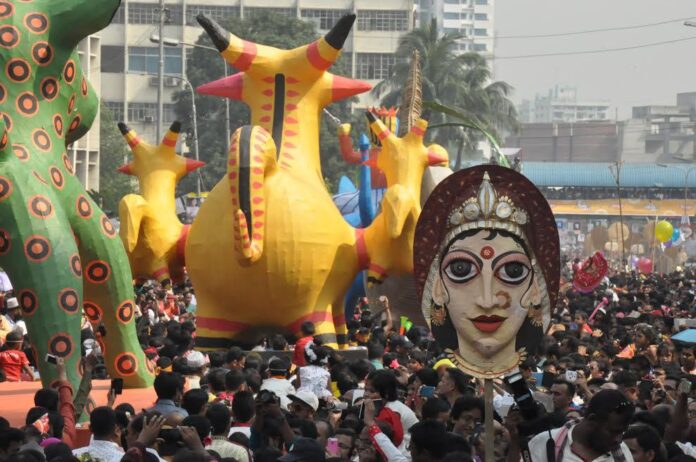In a significant cultural shift, Bangladesh has decided to rename and revise the contents of its iconic Bengali New Year procession, the UNESCO-recognised Mangal Shobhajatra, amid growing pressure from Islamic political and religious organisations.
The annual procession, long considered a symbol of secularism and cultural identity, will now be known as “Barshavaran Ananda Shobhajatra”. The announcement was made during a press conference at the Faculty of Fine Arts, Dhaka University—the institution that originally conceptualised and organised the event since the early 1980s.
The change comes ahead of the celebration of Bengali New Year 1432, or Pohela Boishakh, on April 14, and reflects the interim government’s broader policy of “inclusiveness,” according to Cultural Affairs Adviser Mostafa Sarwar Faruki. The government, led by Nobel Laureate Muhammad Yunus, has branded the move part of its “New Bangladesh” cultural healing initiative.
Mangal Shobhajatra was inscribed on UNESCO’s Representative List of Intangible Cultural Heritage of Humanity in 2016. It features elaborate masks, symbolic floats, and motifs celebrating Bengali folklore and unity. However, critics from several Islamic groups, including Hefazat-e-Islam and the influential Peer of Charmonai, have called the procession “Hindu in character” and demanded the removal of terms and symbols they associate with Hinduism, particularly the word “Mangal” (meaning ‘auspicious’).
Mufti Syed Muhammad Faizul Karim, the Peer of Charmonai, said, “Hindutva symbols, concepts, and connotations, including the word ‘Mangal’, must be eliminated from Pohela Boishakh celebrations.”
Hefazat-e-Islam leaders Ameer Allama Muhibullah Babunagari and Secretary General Allama Sajedur Rahman echoed these sentiments, alleging that elements of Hindu rituals were being imposed on the public in the name of universality.
The move has sparked concern among secular and cultural activists, who fear the erasure of Bangladesh’s pluralistic heritage. However, the interim administration insists the changes are not about erasing history, but about broadening participation and promoting unity.
The newly named “Barshavaran Ananda Shobhajatra” is expected to retain the festive spirit of Pohela Boishakh while adapting its symbolism to better reflect the country’s religious and cultural diversity.


